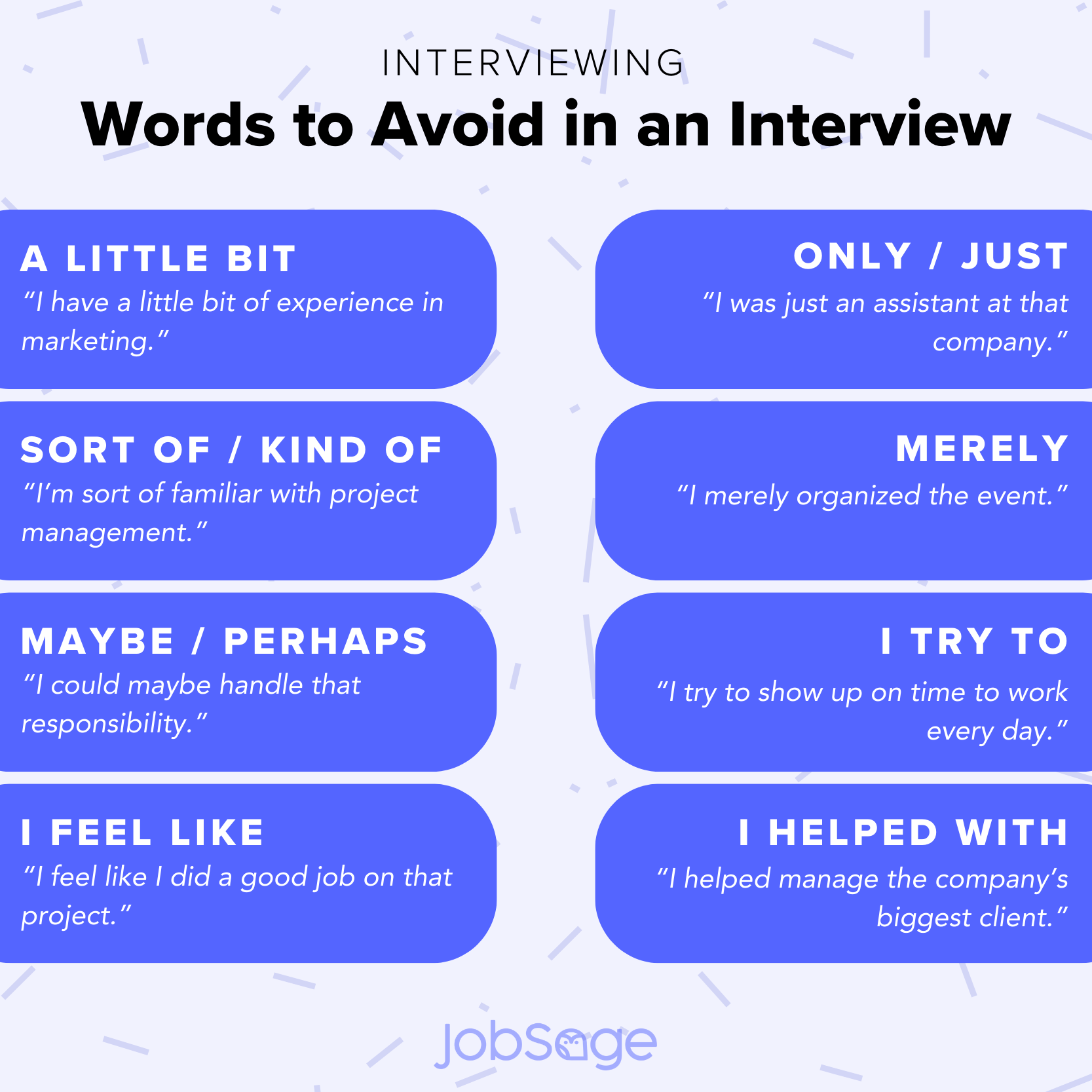In a job interview, your words hold immense power. They can open doors— and close them. You’re there to showcase your best self, and to do so, it is just as important to know what not to say as it is to say the right things.
Navigating an interview is not just about avoiding the obvious blunders; it’s about steering clear of those subtle comments and questions that can unintentionally give the wrong impression.
In this blog, we’ll cover fourteen things to avoid in a job interview to help you get the upper hand.
1. Negative comments about your previous employer
Bad mouthing a past employer can be a red flag for interviewers. It suggests you might be difficult to work with or that you’ll speak poorly of this company in the future. Instead, focus on what you learned from past experiences and how they’ve prepared you for this new role.
DON’T SAY: “My last boss was terrible and didn’t know what they were doing.”
INSTEAD SAY: “I’m looking for an opportunity where I can better utilize my skills and grow professionally.”
2. Jumping the gun on pay and perks
Bringing up salary and benefits too early can make it seem like you’re only interested in what the company can do for you rather than what you can contribute. Wait for the interviewer to broach these topics or until you’re further along in the process.
DON’T SAY: “How much vacation time do I get and what’s the salary?”
INSTEAD SAY: “I’m really interested in learning more about the workplace culture here. What things does your organization value most?”
3. Confessing lack of skills or experience unnecessarily
While honesty is important, underselling yourself by focusing on what you can’t do doesn’t help your cause. Highlight your strengths and how you’re eager to learn and grow in areas where you’re less experienced.
DON’T SAY: “I’ve never really done anything like this before; I’m not sure I’ll be good at it.”
INSTEAD SAY: “While I have not directly experienced this type of role, I am eager to learn and have a strong foundation in [related skill or experience].”
RELATED: How to Write a Resume with No Experience

4. Words that downplay your abilities
Using language that minimizes your achievements or abilities can make you seem less confident and capable.
Words to avoid include:
- “A little bit”: This suggests that your experience or skill is minimal. For instance, saying “I have a little bit of experience in marketing” can make your experience sound insignificant.
- “Sort of” / “Kind of”: These phrases can make you sound unsure of your own abilities. Saying “I’m sort of familiar with project management” might make it seem like you lack confidence or depth in that area.
- “Maybe” / “Perhaps”: Using these words can make your statements seem less definitive. For example, “I maybe can handle that responsibility” does not inspire confidence in your abilities.
- “I feel like”: This can make your statements sound more like opinions than facts. Saying “I feel like I did a good job” is less powerful than stating “I delivered strong results.”
- “I was only” / “I was just”: These minimize your role or contribution. For example, “I was just an assistant” or “I was only a part of the team” can undermine your actual impact.
- “Merely”: This is another word that diminishes the significance of what you’re discussing. Saying “I merely organized the event” can belittle what might have been a major accomplishment.
- “I try to”: Suggests effort without accomplishment. For example, “I try to meet all my deadlines” could imply that you don’t always succeed.
- “I helped with”: While teamwork is important, be careful not to understate your role. “I helped with the project” can sound like you played a minor part when you might have been instrumental.
Use positive, assertive language to describe your skills and accomplishments.
RELATED: 7 Tips to Calm Your Nerves Before Your Interview
5. Overly ambitious plans like rapid advancement or career changes
Discussing plans to quickly move up or out can make you seem like you’re not committed to the role you’re interviewing for. Focus on how you’re excited about the opportunity at hand and how you see yourself growing within the company.
DON’T SAY: “I plan to use this position as a stepping stone to higher roles in a short time.”
INSTEAD SAY: “I’m excited about the growth opportunities here and look forward to contributing to the team and advancing my skills.”
6. “I don’t have any weaknesses.”
A common interview that you’ll find in a job interview is “What are your weaknesses?”
Don’t say that you don’t have any. This statement can come across as arrogant or lacking in self-awareness.
The interviewer expects you to have a weakness— after all, nobody is perfect!
It’s more effective to acknowledge a real (but not critical) weakness and discuss how you’re working to improve it.
7. Gossip or insider info about previous employers
Sharing gossip or confidential information from past employers can raise serious concerns about your discretion and professionalism. Always maintain confidentiality and focus on your own experiences and achievements.
DON’T SAY: “At my last job, I heard our manager was getting fired for misconduct.”
INSTEAD SAY: “I’ve learned a great deal from my previous roles and am ready to apply those learnings in a new environment.”
8. Over-emphasizing work-life balance
We get it— work-life balance is extremely important! And while it’s okay to ask questions about expectations about when and where you’ll be expected to work, focusing too much on these aspects can make it seem like you’re more interested in time off than the job. Frame your questions in a way that shows you’re interested in being productive and fitting into the company’s culture.
DON’T SAY: “How often can I work from home? I prefer not to come into the office much.”
INSTEAD SAY: “Can you share more about how the team balances work responsibilities and personal time?”
9. A rehearsed script
While preparation is key, sounding too rehearsed can make you seem insincere or robotic. Aim for a natural conversation flow, showing your genuine interest and personality.
10. Questions that you should already know the answer to
Asking basic questions about the company or the role, which could be answered with a little research, can make you seem unprepared or disinterested. Do your homework and come prepared with thoughtful, insightful questions.
DON’T SAY: “What does your company do?”
INSTEAD SAY: “I’ve read about your recent work in [specific area]; could you tell me more about how this project fits into the company’s future plans?”
RELATED: What to Ask a CEO in an Interview (From an Actual CEO)
11. Information like health history, personal struggles, family problems, etc.
Oversharing personal information that’s not relevant to the job can derail the interview. Keep the focus on your professional qualifications and how they align with the job requirements.
DON’T SAY: “I need a job because I’ve been dealing with a lot of family issues lately.”
INSTEAD SAY: “I’m excited about the opportunities this role presents and how my skills can contribute to the team.”
12. Controversial topics
Bringing up divisive issues like politics or religion can be risky and distract from the main purpose of the interview. Stay focused on your professional skills and the role at hand.
13. Inappropriate language
Using slang, jargon, or inappropriate language can come across as unprofessional. Stick to clear, concise, and respectful language to communicate effectively.
14. Questionable jokes
Humor can be subjective, and what’s funny to you might not be to someone else, especially in a professional setting. Avoid making jokes that could be misinterpreted or deemed inappropriate.
When in doubt, leave it out!
Here’s a golden rule to keep in mind: when in doubt, leave it out.
The art of acing an interview often lies as much in what you choose not to say as in what you do. If you’re unsure whether a comment, question, or topic might be off-putting or irrelevant, it’s usually safer to steer clear.
Remember, an interview is your opportunity to present a polished, professional version of yourself. By carefully selecting your words and avoiding potential pitfalls, you’ll not only avoid common blunders but also strengthen the positive impression you leave behind.
